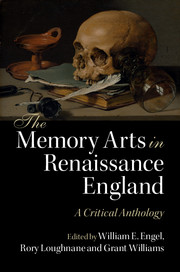Book contents
- Frontmatter
- Dedication
- Contents
- List of figures
- Acknowledgements
- A note on abbreviations
- Introduction
- PART I The art of memory
- PART II Rhetoric and poetics
- PART III Education and science
- PART IV History and philosophy
- PART V Religion and devotion
- PART VI Literature
- Introduction to Part VI
- POETRY
- VI.1 John Skelton, ‘Upon a Dead Man's Head’ (1527)
- VI.2 Edmund Spenser, The Faerie Queene (1590)
- VI.3 Anthony Sherley, Wit's New Dial (1604)
- VI.4 Richard Niccols, Mirror for Magistrates (1610)
- VI.5 Abraham Holland, ‘A Funeral Elegy’ (1626)
- VI.6 George Herbert, The Temple (1633)
- VI.7 Francis Quarles, Emblems (1635)
- VI.8 Mary Fage, Fame's Rule (1637)
- VI.9 Margaret Cavendish, selected works
- VI.10 John Milton, Paradise Lost (1674)
- PLAYS AND PROSE
- Index
VI.3 - Anthony Sherley, Wit's New Dial (1604)
from POETRY
Published online by Cambridge University Press: 05 August 2016
- Frontmatter
- Dedication
- Contents
- List of figures
- Acknowledgements
- A note on abbreviations
- Introduction
- PART I The art of memory
- PART II Rhetoric and poetics
- PART III Education and science
- PART IV History and philosophy
- PART V Religion and devotion
- PART VI Literature
- Introduction to Part VI
- POETRY
- VI.1 John Skelton, ‘Upon a Dead Man's Head’ (1527)
- VI.2 Edmund Spenser, The Faerie Queene (1590)
- VI.3 Anthony Sherley, Wit's New Dial (1604)
- VI.4 Richard Niccols, Mirror for Magistrates (1610)
- VI.5 Abraham Holland, ‘A Funeral Elegy’ (1626)
- VI.6 George Herbert, The Temple (1633)
- VI.7 Francis Quarles, Emblems (1635)
- VI.8 Mary Fage, Fame's Rule (1637)
- VI.9 Margaret Cavendish, selected works
- VI.10 John Milton, Paradise Lost (1674)
- PLAYS AND PROSE
- Index
Summary
About the author
Anthony Sherley (fl. 1604) is a little-known English poet. Wit's New Dial is dedicated to Sherley's brother-in-law, Thomas Pelham, whom he describes as ‘Justice of the Peace, and one of his majesty's deputy-lieutenants’ in Laughton, East Sussex. The collection is also dedicated to Pelham's wife, Marse. In Sherley's dedication, he says that he wrote the series of poems while staying ‘under [the Pelhams’] roof’ at ‘Hawleland’ for ‘almost a year’. Sherley says that he is indebted to the Pelhams for their ‘exceeding kindness’ and that this collection is a ‘poor gift’ to the family. Wit's New Dial appears to be Sherley's first and only extant work. With faux modesty (or perhaps genuine trepidation about the collection's reception), he reveals that he is ‘but newly bound to the trade’ (i.e. of writing poetry), ‘yet not bound neither’ to continuing in the profession. If the Pelhams ‘like not [his] workmanship, [he] will give it over forever’.
About the text
A collection of eighty-eight short poems, Sherley begins his series with ‘Of God’ and ends with ‘Of hell’. The poems, all written in quatrains, vary in length from five to ten stanzas. Morally didactic in tone, Sherley discusses a wide range of subjects and behaviours, such as ‘chastity’, ‘wit’, ‘drunkenness’, etc.
The arts of memory
‘Of Memory’ is the thirtieth poem in the series, but its subject is central to the overall enterprise. The collection has been overlooked by scholars, but Sherley's poems offer a storehouse of commonplace knowledge and folk wisdom in the period. As per the traditional metaphor found in Shakespeare's Hamlet (VI.12), Sherley describes the mind as a ‘table’ (tabula) on which memory is written.
Textual notes
Anthony Sherley, Witts new dyall: or, A schollers prize (London, 1604), E2r.
Wit's New Dial
‘Of Memory’
1.
The heart's own privy key,
I will call good memory:
It keeps all close, and opens all,
That security cannot slip or fall.
2.
The mother to the muses,
Turns thoughts to their best uses:
'Tis wisdom's light
And the blind's sight.
3.
The memory of man,
Is like a curious net,
The small things it lets slip,
But greater things doth get.
- Type
- Chapter
- Information
- The Memory Arts in Renaissance EnglandA Critical Anthology, pp. 291 - 292Publisher: Cambridge University PressPrint publication year: 2016



